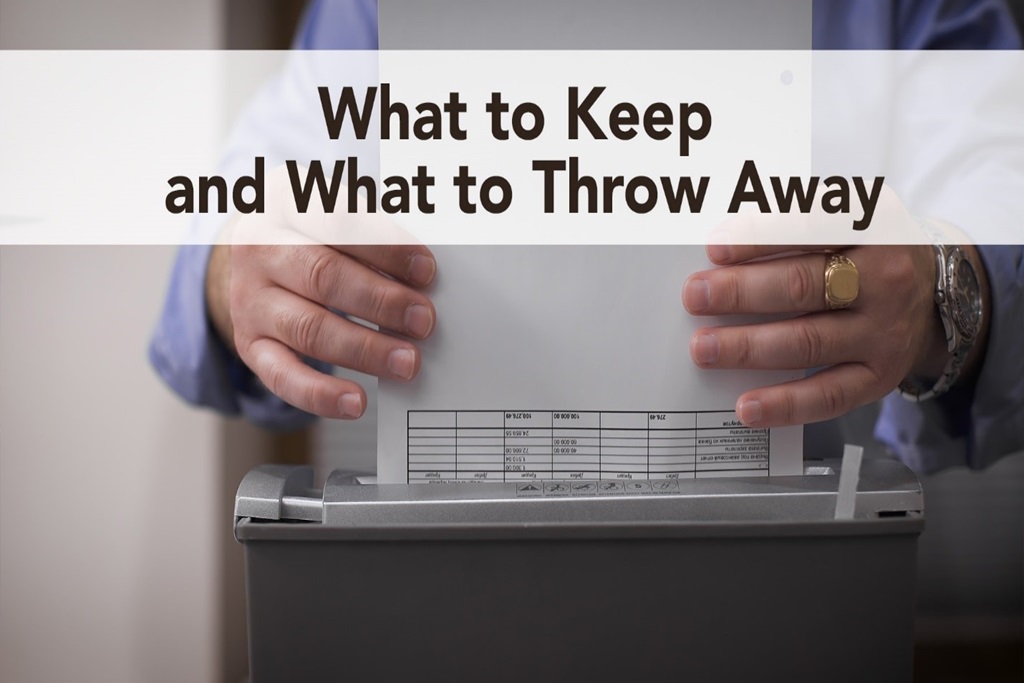
23 Oct How Long?
Before sending all your documents through a paper shredder or filing them in your pile of bills and other records, know what you should keep and what you should throw away.
It’s unbelievable to hear that, each day, the typical family receives five to 10 important items related to school, finances, social events, or work, according to Jack Gillis, former public affairs director for the Consumer Federation of America in Washington, D.C. This easily translates to 50 items a week or 2,500 items a year.
Many businesses are moving into more paper-free environments; however, we’re still inundated with paper at home. Keeping track of everything can be overwhelming.
Take a look at the table to figure out what you should keep and for how long:
| How long to keep/What to keep |
| Permanently: IRA contributions Keep nondeductible contribution records permanently in case you need to prove you paid tax on the money when you want to withdraw it. |
| One year – permanently: Retirement/Savings plan statements Keep quarterly statements until you receive your annual summary; if everything is correct on your annual summary, you can toss the quarterlies. It’s best to hold on to annual statements until you retire or close the account.Credit union records At the end of each year, go through your share draft carbons or share draft statements and only keep those related to taxes, business expenses, and housing or mortgage payments. Bills |
| Six years – permanently: House records Keep purchase price information and the cost of permanent improvements to your property such as remodeling. Also, if you buy or sell property, keep records of legal fees and your real estate agent’s commission for six years after you sell your house. Keeping these records, especially home improvement records, is important and could help lower future capital gains tax (despite tax law changes) should you decide to sell. |
| 45 days – six years: Credit card receipts and statements Keep receipts until your monthly statement arrives; if that’s correct, toss the receipts unless you need them for other reasons such as warranties. Hold on to the statements for six years if they contain tax-related expenses. |
| One year: Paycheck stubs Make sure the information on your paycheck stubs and annual W-2 match when you receive it, then throw the stubs away if it does. If the information doesn’t match, notify your employer. |
| Seven years: Tax records The IRS has three years to audit your return and you have three years to file an amended return to claim a refund if you made a mistake. If you made the mistake of underreporting your gross income by 25% or more on a return, the IRS has six years to challenge it. If you filed a fraudulent return or didn’t file one at all, the IRS can catch you on it at any time. |
While it’s important to keep these documents, it’s just as important to keep them in the right place. A countertop organizer is one way to start filing papers. Once your countertop organizer starts to get full–or even before–move items to more permanent storage such as a filing cabinet or safe deposit box.
Store anything you need to keep permanently in either a fireproof storage box or safe deposit box. Keep marriage records, divorce papers, and birth certificates in a safe deposit box. Experts suggest you not carry the key to your safe deposit box with you–keep one in the house and one with a relative, close friend, or attorney.
Knowing where important documents are–such as birth certificates, financial records, and marriage licenses–is necessary in case of a flood, tornado, or fire. Make sure these documents are easy to get hold of in case you need to evacuate your home suddenly.




Sorry, the comment form is closed at this time.